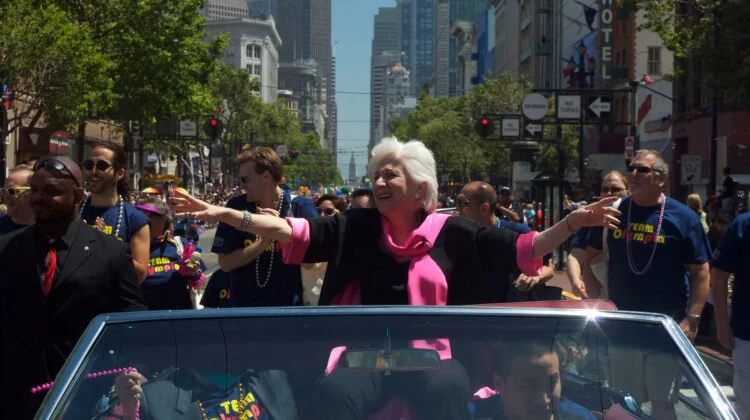Film reviews: Vancouver Greek Film Festival highlights female directors and emerging talents
Works profile a divinely gifted teen, an Athens sex worker, and a bracingly candid Olympia Dukakis
Olympia Dukakis as Pride Parade celebrity marshall in Olympia.
Holy Emy tells the story of a a surly Filipina teen with divine and impossible gifts.
The Second Annual Greek Film Festival runs at The Cinematheque from June 1 to 4
IF YOU’RE STRUCK by the breadth, daring, and artistry of the second annual Vancouver Greek Film Festival, put on here by the Hellenic Canadian Congress of BC and The Cinematheque, well, that’s exactly the point.
Yes, there will be a look back at Greek classics in filmmaking—namely, Elia Kazan’s luminous America America, from 1963. And there will be a feature-length documentary look at the legacy of Olympia Dukakis (see below). But this year also highlights emerging and established female directors, whose films explore the complex web of political, social, and economic issues in Greek society today.
Here’s our look at three highlights.
HOLY EMY
June 2, 8:30 pm
The story of a surly Filipina teen with divine and impossible gifts—she can heal the sick, read minds, generate miracles, and she bleeds from her eyes—Holy Emy is nevertheless situated inside a notably disenchanted world of urban bustle, tacky 21st century design, and ugly handheld camerawork. Araceli Lemos’s film parts from its blunt docudrama strategy only for a couple of sequences, and then just briefly, as when Emy wades into an oil-blighted shoreline to return life to one of hundreds of dead fish. Without betraying any of its secrets, the film wants to make a point or two about the perception of the mystical inside our matrix of rationality, modern politics, and organized religion, only gradually revealing the how and the why of Emy’s powers. The viewer is repeatedly grounded in the corporeal, with vomit, blood, and mortified flesh as a recurring motif (although it’s anything but gross, just very matter-of-fact), while the question of God, the Devil, and whatever lies in between is settled by the somewhat ambivalent figure of Emy herself, whose first great act of healing is so brutal it looks like sexual assault. Apologies if this all sounds very high concept, ’cuz the mundane storytelling stuff—sullen Emy lives in Athens under uncertain circumstances with her pregnant sister, mom is home in the Philippines for mysterious reasons—is all very gripping, while the film’s leads are excellent, young Abigael Loma in particular as the wholly inscrutable creature of the title. AM
DAYS AND NIGHTS OF DEMETRA K
June 2, 6:30 pm
Demetra is a prostitute, which is what she calls herself, and she’s the remaining owner-operator of a faded brothel in Athens. “Isn’t my whorehouse in tip-top condition?” she asks documentarian Eva Stefani. But business isn’t good and Demetra knows why. On the phone to a friend, she laments: “No business in the brothels, imagine what the rest of the economy is like.” Filmed over 10 years, Days and Nights of Demetra K builds a lot of detail and colour into its swift running time. Demetra is an avid animal lover with loyal friends, a fierce mother, and a boy pal named Spyros, whose face we never see. Her endearingly baroque tastes, like the royal portraits that decorate her home, give the film a dense, old-world humidity. She’s prone to lounging topless in front of the camera and is rarely at a loss for words, preferring what she calls common sense over ideology, especially on the topics that concern her most as the president of the Sex Workers Union of Greece. A veteran of the country’s first licensed brothel, she states: “Imagine, we were legal under authoritarian regimes, and now, in supposedly liberal ones, they make our lives a living hell.” Speaking as an uninvited guest at a public conference on trafficking, which she naturally abhors, Demetra blasts the committee: “The ‘Ladies of Equality’—or rather, inequality—can’t put us all in the same basket,” she protests. Turning to the camera, she remarks: “Cooped up in their offices but they think they know best. And they get paid for this shit.” Coming exactly halfway through the film, it’s a comfort when Demetra leaves the beige halls of bureaucracy and returns to the mess of an ancient Greece. AM
OLYMPIA
June 4 at 7 pm
“It never goes away—that thing of being outside,” Olympia Dukakis reflects in Greek-American filmmaker Harry Mavromichalis’s candid documentary about the late Hollywood and stage actor. And in this thorough portrait, Dukakis points out how she’s been “identified ethnically”, from the days she spent growing up in a white part of New Jersey (and carrying a knife to defend herself from bullies) to breaking into acting—eventually even launching her own The Whole Theatre company so she could work. With unfettered access to the feisty 80-year-old and her family, and plenty of film and theatre clips, Mavromichalis traces her life, beginning as a girl rebelling against strict Greek parents and 1950s expectations of women to becoming the Hollywood star of hits like Moonstruck and Steel Magnolias. Dukakis, who died in 2021, is a lot, and there is a lot of her in this possibly too exhaustive doc. But what sustains interest is this thesp's bracing unpretentiousness and self-awareness, and her fearlessness about digging deep into subjects like sex, death, aging, feminism, and her acting craft. And while the story rolls out praise for her countless roles onstage and on film, small and large, it refuses to gloss over her story. At one point, a son laments the way his distracted actor parents screwed up the date of his birthday—like, literally from birth. Dukakis comes across as a magnetic and fiercely funny force of nature, uncompromising, perfectionistic, superenergized, occasionally crass, and self-effacing—“being outside” mainly because she was light years ahead of her time. And in many ways still is. As her good friend, Tales of the City playwright Armistead Maupin tells her, she’s an “octagenarian muthafucka”—a term the actor enthusiastically embraces. JS















